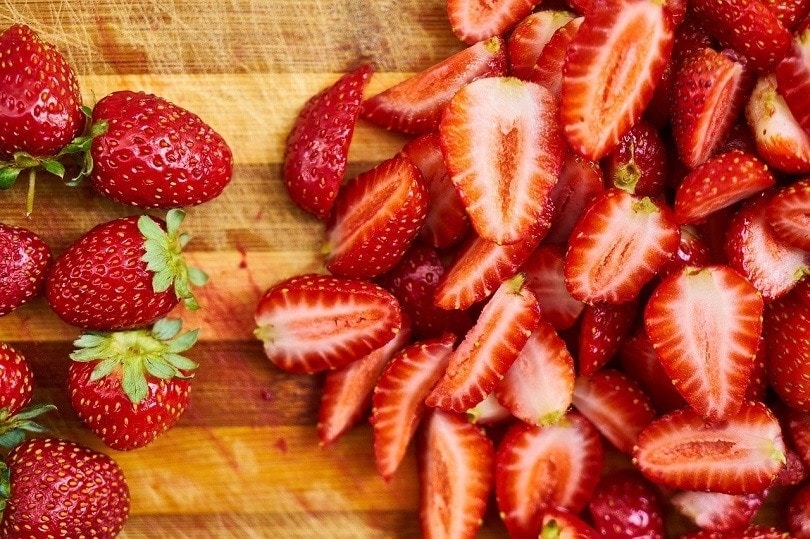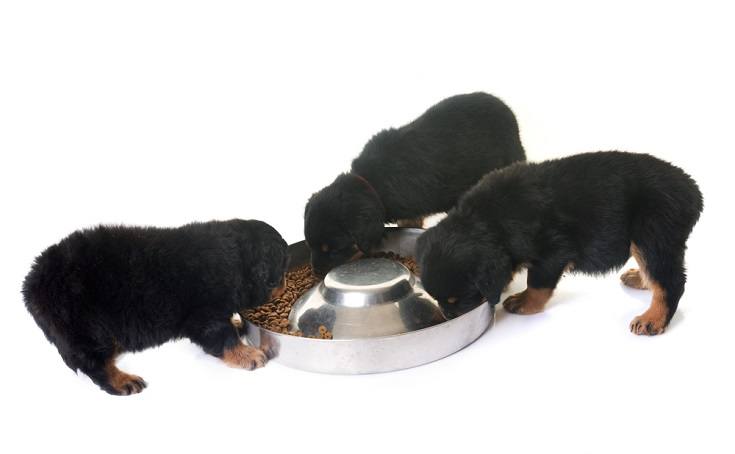Can Dogs Eat Pineberries? Vet Approved Facts & FAQ
Updated on

Click to Skip Ahead
It can seem impossible to keep your dog from scarfing down nearly anything remotely edible on walks or around the house, and it’s especially tricky to tell when they’ve accidentally eaten something toxic. For instance, are garden-variety pineberries okay for dogs to eat? Yes, pineberries are safe for dogs and they’re even healthy in moderate amounts with your dog’s regular balanced diet. Pineberries are packed with vitamins C and A, plus other good stuff like fiber and folate.
Many other types of berries are scrumptious and nutritious for your dog, but it’s challenging to identify the safe from the unsafe ones sometimes. Read on as we talk more about the nutritional content of pineberries, other good berries for dogs, and how to add berries to a regular balanced dog diet.
What Are Pineberries?
All pineberries are white strawberries, but not all white strawberries are pineberries. Confused?
Alpine white strawberries are a naturally occurring mutation of the traditional strawberry that lack the gene that codes for the characteristic red coloring.
Pineberries are a hybrid cultivar which has been deliberately bred from this mutation to create a white (or very pale pink) fruit with red seeds and pink flesh. Their name comes from the fact that some describe their flavor as being reminiscent of pineapple.

Nutritional Content & Benefits of Pineberries
These berries are healthy and delicious to humans and dogs alike, and they’re a great way to get some variety in your diet. Let’s check out exactly what good stuff, nutrition-wise, is in pineberries and what it does for your pooch.
- Vitamin A: Essential vitamin that boosts the immune system, bone health, vision, skin/fur health, and more.
- Vitamin C: Antioxidant that helps fight illness-causing free radicals, and boosts energy levels.
- Fiber: The high fiber content in pineberries makes them a great low-calorie snack to keep your dog feeling fuller for longer.
- Folate: Confers numerous benefits to the immune system, skin/fur health, cognitive health, and more.
What Other Berries Are Safe for Dogs?
Pineberries are a healthy and sweet snack for your dog, and if you’re looking to mix it up by adding some other healthy berries to your dog’s diet or as a treat, we have a lot of options for you. But first, we need to share some information that may just upset your world view: Strawberries are not technically berries. Neither are raspberries or blackberries. But, for the sake of simplicity, let’s pretend they are!
- Blueberries: Loaded with vitamins C, K, antioxidants, and fiber, these are one of the ultimate berries for dogs.
- Strawberries: These red ripe berries offer lots of vitamin C, K, B6, K, minerals, fiber as well as an enzyme that helps clean doggy teeth.
- Blackberries: Replete with vitamins K, C, B1, B6, and minerals like potassium and folic acid—just make sure to wash your berries first!
- Bananas: yep, these guys are technically berries! They’re quite high in sugar, so they shouldn’t have too much, but your dog will likely enjoy a few slices of this Vitamin K rich treat. Just remember to remove the peel.
Are Berries Healthy for Dogs?
Yes, but only in moderation. Dogs don’t need much sugar in their diet, and despite the other healthy makeup of berries, they’re fairly high in sugar. A handful or so of berries won’t hurt your dog every couple of days, but they shouldn’t be a staple in their diet. Remember that no treats can replace a properly balanced canine diet, which gives your dog everything they need to stay happy and healthy.
Additionally, too much fruit in your dog’s diet can lead to gastrointestinal upset, bloating, and diarrhea.

Berries & Foods to Avoid for Your Dog
Many edible berries for us are edible for our four-legged friends, but there are some that you should keep away from your dog at all costs. The following berries pose toxic or choking hazards to your dogs, so take notes!
- Cherries
- Grapes
- Raisins
- Holly berries
- Juniper berries
How to Safely Include Berries in Your Dog’s Diet
Berries are a low-calorie snack that dogs usually love, but do exercise some restraint. Some dogs don’t do well with sudden changes in food, while others can eat anything and everything with no perceived ill effects. That said, let’s take a look at some tips you can use to mix up your dog’s day with berries.
- Thoroughly wash and drain any berries before preparing them.
- Add a small amount to your dog’s bowl at mealtime to introduce it.
- Closely observe your dog after they eat to see if they tolerate it well, as some dogs can have allergic reactions to new foods, just like people.
- Freeze some crushed berries in a popsicle or ice tray to create a sweet summer treat for your dog.
Conclusion
Pineberries are a unique little strawberry with a hint of pineapple, and your dog can enjoy a couple with you from time to time. It’s even healthy, packed full of vitamins A, C, and more. The key to adding pineberries, or any other berries to your dog’s diet, is to start slowly and with small amounts because they don’t need a lot and any small diet change can cause stomach upset.













